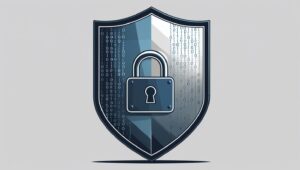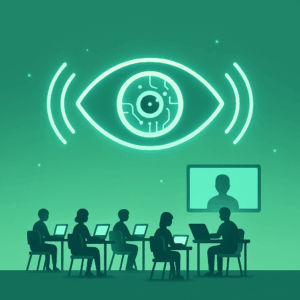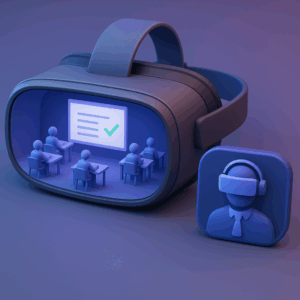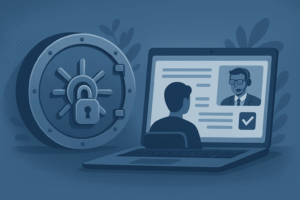Online learning has opened countless doors to making education more and more accessible. Students and teachers can connect beyond the traditional classroom setups. The most significant benefit is that online courses are gaining acceptance in the corporate world. More and more firms are hiring students who have completed online programs, certifications, or courses. All this was possible only because the entire online education infrastructure stands strong on the foundation of online proctoring solutions for safeguarding exam integrity.

What is Academic Dishonesty in Online Learning?
When students attempt to access prohibited source material for answering in exams is called academic dishonesty. Hence, it is imperative to cultivate a strong culture of academic integrity in the university, school, and institution. Teachers and administrators must collaborate with students to implement a positive dialogue to state the benefits of having academic integrity during exams. Also, remote proctoring tools can be a valuable medium to enforce ideal practices during exams.
Academic integrity in higher education is a very critical task for educationists. Especially online courses should take extra care to protect the credibility of their course reputation. Academic integrity in online education adds the flavor of trust and security, which are critical for these courses’ higher acceptance in the industry.
Why Does Academic Dishonesty Occur?

Cheating in exams exists as long as the exams have been there. From peeping into the next person’s answer sheet to sneaking a cheat sheet into the exam hall happens everywhere. While academic cheating is acknowledged, a deeper analysis of the reasons should happen.
• Personal Reasons
Experts suggest that cheating is a personal choice students make to achieve their academic goals. Sometimes lack preparation; other times, peer pressure comes their way. In some instances, high-stake exams pressure leads students to use unethical methods to cheat during their exams. Students use the excuse that due to immense competition, they use the support of cheating techniques to get ahead of others. In some rare cases, psychological disorders play a role in motivating students to cheat during tests.
• Institutional Reasons
Any student forms a part of a larger group and may belong to a university, college, or school. The culture at the place of belonging also determines the level of cheating. In institutes with great pride in delivering quality education with high values, the students tend to cheat less. Also, institutions where the administration holds open discussions with students to enforce and explain the importance of ethical behavior face fewer challenges during exams.
Educational institutes focusing less on delivering quality education must connect with their students. Suh disconnect leads the students to cheat during the exams as they must develop an adequate understanding of the subject. Hence, take the support of cheating to secure a good score.

How to Reduce Cheating in Online Exams?
Online exams are more vulnerable to cheating due to the lack of physical presence of invigilators around the students. However, some long-term and short-term strategies can considerably reduce these instances.
Let us see some strategies to help minimize cheating during online exams and enhance academic integrity in the learning environment.
• Focus More on Understanding
Institutes and educators can form a curriculum for their students that focuses on harnessing and evaluating a complete understanding of the subject. Case studies, industry training sessions, and projects are helpful mechanisms for developing deeper subject understanding. Hence, automatically the focus goes down from the traditional exams. Evaluation scores must be segregated between such projects and exams to give students a fair chance to perform.
• Open Discussions with Students About Dos and Don'ts
Transparent and explicit policy discussions always help bring parties on the same page. Colleges and educators should encourage students to be mindful of the long-term benefits of exhibiting ethical behavior during examinations. Clear repercussions should be communicated to the students in case they get caught cheating.
• Implement Robust Digital Infrastructure for Prevention
The best way to prevent cheating for online exams is to use an intelligent online proctoring platform. Solutions such as Proctortrack come with many alternatives to suit the exact requirements. Institutes allowing the students to appear for exams on their devices within the campus can utilize solutions like ProctorTA.
For low-stake, exams can use the technology of browser lock to restrict access to prohibited websites. Such solutions can help the remote and class-based invigilators to monitor students closely using AI. Exclusive dashboards are present within the systems to check various pre-flagged suspicious behaviors. Very accurate, timely, and fair invigilation is possible with online proctoring solutions.
• Knowledge-Based Evaluation
Institutions must evolve their methods to assess students’ understanding. More complex questions must come in exams to understand students’ fundamental knowledge. Rather than putting up conventional questions they can memorize and answer in exams, the questions should focus on practically implementing the same. Hence, twisting questions a little and pushing students to use their understanding is a more effective method to examine their knowledge. If traditional questions come in exams, students may feel tempted to seek answers from other sources to copy.
Summing Up
How do you explain academic integrity? Simply put, when students use ethical ways to answer exam questions, it is called academic integrity. Online education has its pros and cons. Accessibility and scale are significant advantages. On the other hand, cheating instances happening during online exams are certainly a considerable task on hand. Best remote proctoring services such as Proctortrack Offers state-of-the-art technology to ensure that academic integrity is intact throughout the online exam process. Students will try to find newer and more advanced ways to cheat. However, Remote proctoring tools are always responsible for innovating more robust preventive measures in their technology.











